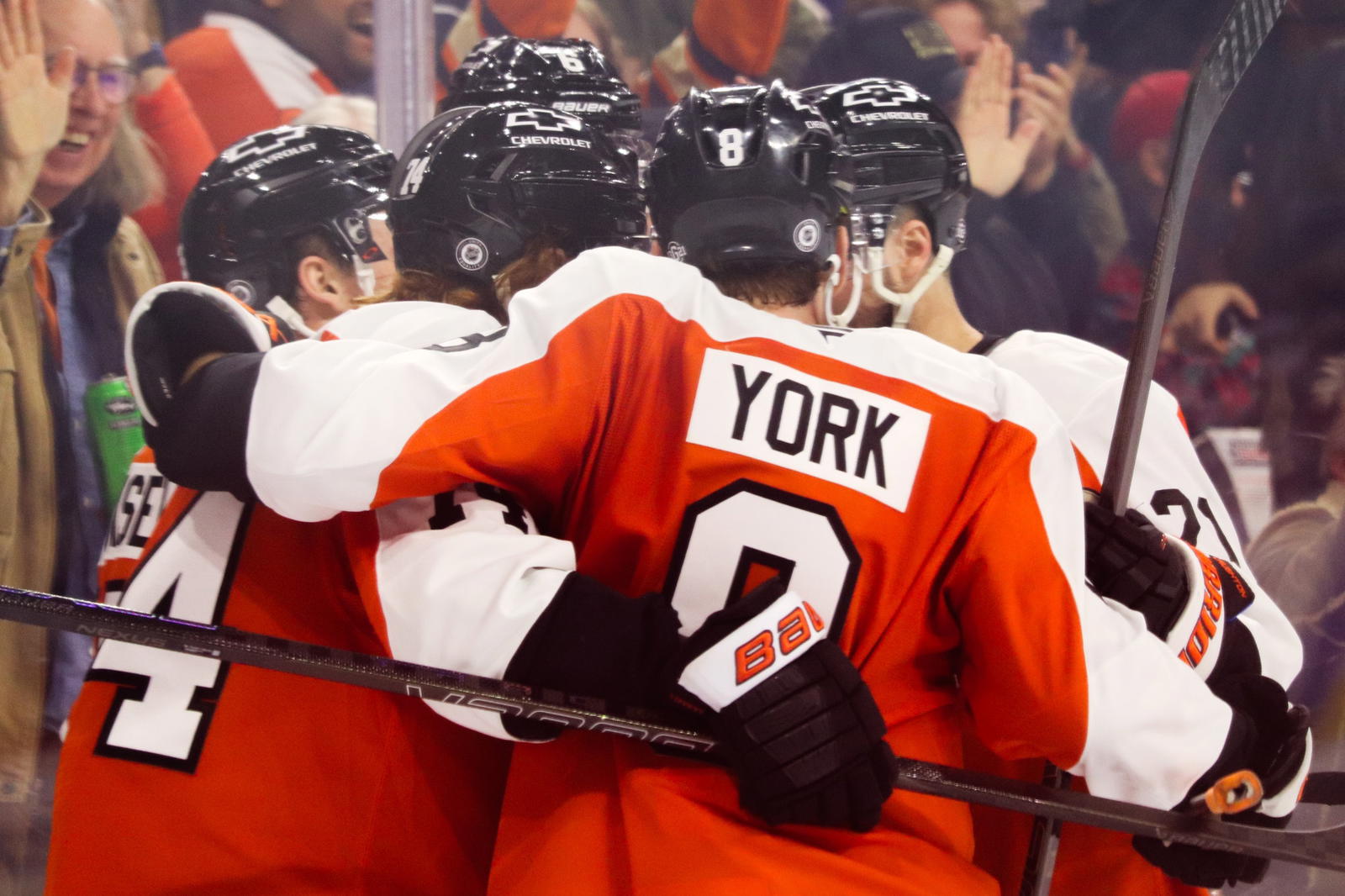
There’s a tension that exists when a rebuilding team starts showing signs of being... actually good. Not just plucky or ahead-of-schedule—but genuinely competitive, capable, and resilient. That’s where the Philadelphia Flyers find themselves now. And it’s a strange, often uncomfortable place to be.
In a league that increasingly rewards patience and punishes ambition, there’s a growing tendency to fear overperformance. Teams are wary of winning too soon and accelerating a timeline that hasn’t yet reached its conclusion. And in many ways, that caution makes sense. You don’t want to blow future flexibility for a flash-in-the-pan playoff run. You don’t want to convince yourself you’re close when you’re not. You don’t want to lose sight of long-term goals in a fit of short-term excitement.
But here’s the thing: you also don’t want to miss the moment when your team is telling you it’s ready.
The 2024–25 Flyers weren’t perfect. At times, they were infuriating. They had long scoring droughts, conflicts between players and coaches, and stretches where it felt like the wheels might come off. But through all the chaos, they continued to find identity and structure and, more importantly, they continued to show signs—real, tangible signs—that they’re ready to start making serious playoff pushes.
So now the question becomes: what do you do with that?
The Fear of Overperformance, and Why It’s Overblown
It’s become almost cliché in modern hockey discourse: overperforming is dangerous. It leads to false confidence. It tempts you into trades you shouldn’t make, contracts you’ll regret, and playoff berths that only delay the inevitable rebuild. It’s the classic trap.
But there’s a flaw in that logic: it assumes overperformance is always empty calories. That it isn’t the product of meaningful progress. That it can’t coexist with long-term sustainability.
What if, instead of overperforming, the Flyers are just evolving faster than expected?
This isn’t a team built on aging vets or unsustainable shooting percentages. It’s a team with an increasingly reliable goaltending tandem. A team that plays with structure. A team with cap flexibility, draft capital, and an organizational pipeline that’s finally beginning to reflect intelligent, patient planning.
This isn’t fool’s gold. It’s the foundation of something real.
Culture Can’t Be Tanked For
One of the most under-discussed elements of rebuilding is what you're teaching your players along the way. In the Flyers' case, they were constantly pushed to tank last season, or at least to take their foot off the gas. At the cost of a potentially better draft pick, that kind of mentality also sends a message—that competing doesn’t matter yet. That wins are optional. That games are placeholders.
And, sure, there are plenty of fans out there that are tired of hearing the word "culture" because they think it's a band-aid to cover up unsatisfactory performances when, in reality, culture is the backbone of any team that's a postseason contender.
https://x.com/SGNolan/status/1750192887650754600
Culture isn’t just about slogans and speeches. It’s about habits. Effort. Accountability. Those things matter now, because they’re going to matter even more when this team is actually ready to contend consistently. And if you haven’t built that muscle by then? You’ll be chasing it.
The Flyers have spent years lost in the wilderness of indecision. Not bad enough to bottom out. Not good enough to compete. For the first time in a long time, they know who they are. And more importantly, they know who they want to be. They’ve invested in identity, in structure, in guys who buy in. What message does it send if they’re suddenly asked to pump the brakes?
Belief Isn’t Delusion—If It’s Backed by Smart Process
Danny Brière and Keith Jones haven’t exactly thrown caution to the wind. In fact, they’ve been remarkably disciplined since taking over. They didn’t chase big-ticket free agents. They didn’t force prospects into the NHL before they were ready. They’ve shed contracts and made long-term bets that reflect a thoughtful, sustainable approach to team-building.
But they’ve also talked—consistently—about instilling belief. About building something that players want to be part of.
There’s a real art to that balancing act: remaining focused on the future while still honoring the present. But that’s the job. It’s not binary. A team doesn’t have to pick one: development or competitiveness. You can do both. In fact, the best organizations do do both.
And that belief matters.
Ask any of the players who were here last season. There was pride, yes. But there was also real frustration. They wanted to get in. Despite what some people may think, they tried hard to get in. And that’s not something you want to kill. That’s something you want to bottle up and carry forward.
Matvei Michkov Changes the Math
Let’s not ignore the elephant in the room. Matvei Michkov’s arrival was always going to mark a turning point in the rebuild. And since his arrival last season after fears he wouldn't be able to come to the U.S. until 2026, there's already been tangible, positive changes rippling through the team.
 Philadelphia Flyers winger Matvei Michkov (39). (Megan DeRuchie-The Hockey News)
Philadelphia Flyers winger Matvei Michkov (39). (Megan DeRuchie-The Hockey News)No, the team's success doesn't fall squarely on his shoulders, because everyone needs to buy in for success to happen (and he cares more about the team than individual glory anyway). And no, his skills won’t fix everything overnight. But what he does do is shift the ceiling. His presence gives the Flyers a legitimate top-line weapon. A power play catalyst. A player who can change games with a flick of the wrists. And now that he has a season under his belt, if his transition continues to go well, suddenly this team looks very, very different.
What Does Sustainability Actually Mean?
The buzzword in any rebuild is “sustainability.” It’s the guiding star. But what does it actually mean?
It doesn’t mean waiting five more years before you try to win again. It doesn’t mean treating a playoff berth like a problem to be avoided. And it certainly doesn’t mean dampening your own progress just to stay on some theoretical timeline.
Sustainability means building something that can last. It means layering in depth. Developing talent. Managing your cap wisely. Building a culture that supports young players and drives results.
It also means knowing when it’s time to shift gears toward a team that doesn’t fear progress but embraces it, that knows when to strike, and that doesn’t apologize for competing.
Don’t Be Afraid to Win
That’s the core of it. Too many teams—and too many fans—have become afraid to win before it’s deemed “time.” They fear it will mess up the rebuild, that it will trap the team in mediocrity.
But here’s the truth: winning is hard. It should be celebrated when it starts to happen—not dismissed, and certainly not feared.
The Flyers are in a unique spot. They’re still young, yes. Still building. But they’ve also got a real shot at taking the next step this season. They’ve got a talented crop of young players and prospects ready to be the next man up. They’ve got growth from within. They’ve got structure. And they’ve got a locker room full of guys who want to keep pushing.
There’s nothing wrong with that. In fact, there’s everything right about it.
What the Flyers Deserve
This team has been through it. The fans have too. The endless cycles of almost and not-quite and maybe-next-year. And now that something real is starting to take shape? It would be a shame to treat it like an accident.
Let them push. Let them believe. Let them win.
Not recklessly. Not foolishly. But fearlessly. Because this might not be the final version of the Flyers. But it’s a version worth rooting for — and one that just might surprise you again.
And if they do? Don’t call it overperformance.
Call it progress.


-1748760603-q80.webp)
